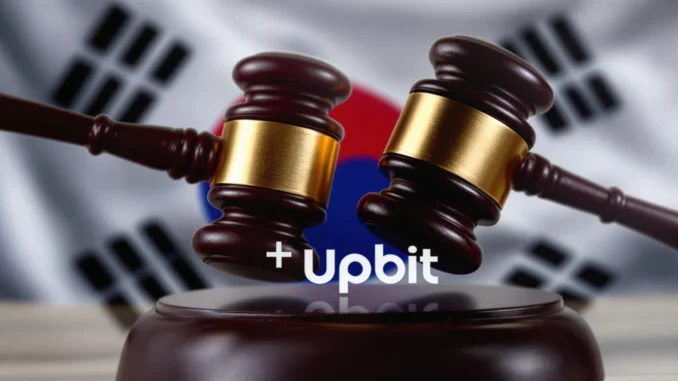
Is South Korea about to drop the regulatory hammer on one of its biggest cryptocurrency exchanges? Recent news suggests that Upbit, a leading crypto platform in the nation, is on the verge of facing sanctions from the South Korean Financial Services Commission (FSC). This development has sent ripples through the crypto community, raising questions about compliance, user security, and the future of digital asset trading in South Korea. Let’s dive into what’s happening and what it could mean for you.
Why is Upbit Facing Potential Sanctions Over Crypto Regulation?
The core issue stems from an inspection conducted by the Financial Intelligence Unit (FIU), a division of the FSC, starting in August of last year. This inspection was part of Upbit’s virtual asset service provider (VASP) license renewal process – a crucial step for any crypto exchange operating in South Korea. However, the FIU’s probe unearthed significant concerns related to Upbit’s adherence to anti-money laundering (AML) regulations, particularly concerning Know Your Customer (KYC) procedures.
FSC Chairman Kim Byoung-hwan has publicly stated that a decision on sanctions against Upbit is imminent, as reported by Yonhap News. This announcement underscores the seriousness of the alleged violations and the potential ramifications for Upbit and its users.
Understanding the AML and KYC Compliance Issues
At the heart of this regulatory scrutiny are AML and KYC requirements. But what exactly do these terms mean, and why are they so critical in the crypto world?
- Anti-Money Laundering (AML): These are regulations designed to prevent the financial system from being used for money laundering – the process of making illegally-gained proceeds (like from drug trafficking or terrorism) appear legitimate.
- Know Your Customer (KYC): KYC procedures are a key component of AML. They require financial institutions, including crypto exchanges, to verify the identity of their customers. This typically involves collecting information like name, address, date of birth, and verifying government-issued IDs.
Think of KYC as the crypto world’s version of asking for ID when you open a bank account. It’s a crucial safeguard against illicit activities.
What are the Alleged Breaches of AML Regulations by Upbit?
While the specifics of the FIU’s findings haven’t been fully disclosed, reports suggest a massive scale of suspected AML breaches, numbering in the hundreds of thousands. These breaches likely revolve around failures in Upbit’s KYC processes. This could mean:
- Insufficient Customer Verification: Upbit may not have adequately verified the identities of all its users, potentially allowing accounts to be used for illicit activities.
- Lax Monitoring Systems: Their systems for monitoring transactions for suspicious activity might have been inadequate.
- Reporting Failures: There might have been instances where suspicious transactions weren’t reported to the authorities as required.
The sheer volume of suspected breaches highlights the severity of the issue and the potential risk it poses to the integrity of the financial system.
Impact of Potential Sanctions on Upbit and its Users
If the FSC decides to impose sanctions, what could this actually mean for Upbit and its millions of users? While the exact nature of sanctions is yet to be determined, potential penalties could include:
| Sanction Type | Potential Impact on Upbit | Potential Impact on Users |
|---|---|---|
| Fines: Monetary penalties imposed on Upbit. | Financial strain on Upbit, potentially impacting operations and future development. | Indirect impact through potential service adjustments or changes in platform features. |
| Suspension of Operations: Temporary or partial suspension of certain services or the entire exchange. | Significant disruption to Upbit’s business, loss of revenue, and reputational damage. | Inability to access funds, trade, or withdraw assets during the suspension period. |
| Corrective Orders: Mandating Upbit to implement specific improvements to its AML/KYC systems. | Increased operational costs for Upbit to upgrade systems and comply with regulations. | Potential improvements in platform security and user safety in the long run. |
| License Revocation (Extreme): Cancellation of Upbit’s VASP license, effectively barring them from operating in South Korea. | Catastrophic impact on Upbit, forcing closure of operations in South Korea. | Massive disruption for users, potential difficulties in asset retrieval, and significant market uncertainty. |
While a full license revocation is considered an extreme measure, even lesser sanctions can significantly impact Upbit’s operations and user experience. The uncertainty surrounding the decision is likely causing anxiety among Upbit users.
What Does This Mean for the Broader South Korean Crypto Market?
The Upbit situation is not just an isolated incident. It’s a reflection of the increasing regulatory scrutiny that cryptocurrency exchanges are facing globally, and particularly in South Korea. South Korea has emerged as a major crypto market, and regulators are keen to ensure its stability and prevent illicit activities. The sanctions against Upbit, if imposed, could signal a stronger regulatory stance and potentially lead to:
- Increased Compliance Pressure: Other crypto exchanges in South Korea will likely be under pressure to tighten their AML/KYC procedures to avoid similar regulatory actions.
- Market Consolidation: Stricter regulations could make it harder for smaller exchanges to operate, potentially leading to market consolidation in favor of larger, more compliant platforms.
- Investor Confidence: While short-term uncertainty might prevail, in the long run, robust regulation can build greater investor confidence in the South Korean crypto market by ensuring a safer and more transparent environment.
Navigating the Regulatory Landscape: What’s Next?
The upcoming decision on Upbit’s sanctions is a pivotal moment for the South Korean crypto market. It highlights the importance of compliance in the rapidly evolving digital asset space. For crypto users, this situation underscores the need to:
- Stay Informed: Keep abreast of regulatory developments and news concerning your preferred exchanges.
- Prioritize Security: Choose exchanges with strong security measures and a proven track record of compliance.
- Understand KYC: Be prepared to complete KYC verification processes, as they are essential for regulatory compliance and user safety.
Conclusion: A Critical Juncture for Crypto Regulation in South Korea
The impending decision on sanctions against Upbit serves as a stark reminder of the growing importance of regulatory oversight in the cryptocurrency industry. As South Korea and other nations grapple with the complexities of digital assets, ensuring compliance with AML and KYC regulations is paramount. The outcome of Upbit’s case will not only shape the future of the exchange but also set a precedent for crypto regulation in South Korea and potentially beyond. Keep watching this space for updates as the FSC’s decision unfolds and the crypto regulatory landscape continues to evolve.



